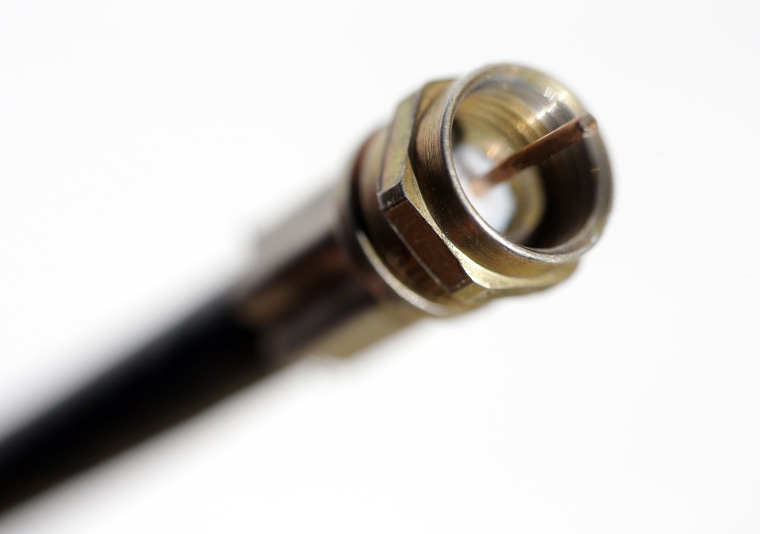We pay a lot of money each month for the digital utilities that power our lives, but we’re not too happy with the service we get.
Internet service providers, subscription TV services (cable, satellite and fiber) and wireless telecom companies continue to disappoint their customers, according to the latest study by the American Customer Satisfaction Index (ACSI) released on Tuesday.
Subscription TV dropped 3 percent from last year, with a score of 63 out of 100, to tie Internet service providers (unchanged) for the worst score among the 43 industries covered by the ASCI.
“People really don’t like the prices they’re paying for these subscription TV services, given the problems they have with them – issues of reliability and generally overall poor customer service,” said ACSI managing director David VanAmburg. “As customers, we really love to beat up on these companies, but there are some tangible things they could do to improve the services they provide.”
Comcast (which owns NBC News) dropped 10 percent from last year to score a 54, just slightly ahead of Time Warner Cable (51), the least satisfying provider in the survey. Verizon’s FiOS (71) is now the leader in this category, followed by AT&T U-verse (69) and DIRECTV (68) and DISH Network (67). FiOS is the only pay TV service to improve its satisfaction rating from last year, up four percent.
“I wouldn’t say satellite and fiber services are great by any means, but they’re certainly head and shoulders above the legacy coaxial cable companies,” VanAmburg told NBC News.
In a statement, Comcast said it has a “massive plan underway to reinvent the customer experience.”
“We are investing an incremental $300 million, hiring thousands of people and looking across our business to make real changes in the way we interact with customers,” the statement said. “We have had early positive feedback from customers who have experienced some of these changes firsthand, but it will take time for those results to be reflected in national surveys like ACSI.”
No other cable companies mentioned in the report responded to a request for comment. The National Cable & Telecommunications Association said in a statement, "The cable industry remains committed to providing consumers with great value and a quality customer experience. We are keenly aware of customer service challenges, and the industry is committed to improving performance and working diligently to learn from our mistakes.”
Satisfaction with ISPs also drops
Most Internet service providers rated worse than a year ago. Customers are frustrated with unreliable service, slow broadband Internet speeds and rising subscription prices. A growing number of people also said they had a hard time understanding their bill.
“Whether it’s realistic or not, we definitely want those download speeds to be faster, more reliable and consistently better than what we’re getting,” VanAmburg explained.
Two large ISPs had a sizeable jump in satisfaction from last year. AT&T U-verse jumped six percent to score 69 to take the lead from Verizon FiOS (68) which dropped four percent. Time Warner Cable gained seven percent to score a 58, still well below the industry average of 63.
Century Link (60), Cox Communications (58) and Charter Communications (57) saw significant drops from last year. Comcast remained in last place with an ACSI score of 56, a drop of two percent.
About 60 percent of U.S. household have only one or no Internet service provider available to them, the ACSI report noted. This lack of customer choice contributes to weak customer satisfaction, VanAmburg said.
Wireless companies struggle, too
Satisfaction with wireless telephone service dropped to 70, down 2.8 percent from last year. Smaller companies that tend to have lower fees and often boast no-contract service, outscored the big name wireless carriers.
“The absence of a contract is very appealing to customers,” VanAmburg said.
Most aspects of the wireless experience – network coverage, dropped calls, call quality, data upload/download speed and reliability – are rated worse than they were last year. The one area that saw significant improvement was the satisfaction with the call centers, up from 66 to 70.
TracFone Wireless, a prepaid phone provider, scored a 77, well ahead of Verizon at 71 (a drop of five percent). Both T-Mobile and AT&T Mobility saw their ratings go up to tie at 70. Sprint dropped four percent to an ACSI score of 65.
The one bright spot – smartphones
We sure do love our smartphones. We like the design and the features, and find them easy to use, but the battery life still rates fairly low.
While the industry average for smartphones remains unchanged at 78, several models from Apple and Samsung scored significantly higher. Samsung’s Galaxy Note 4 had the highest score, 86. The iPhone 6 Plus and iPhone 6 tied the Galaxy Note 3 and Galaxy S5 at 82. (The Galaxy S6 was not on the market when this survey was conducted.)
“It really is Samsung and Apple and then everybody else, and they’re really also-rans when it comes to customer satisfaction,” VanAmburg said.
Herb Weisbaum is The ConsumerMan. Follow him on Facebook and Twitter or visit The ConsumerMan website.
